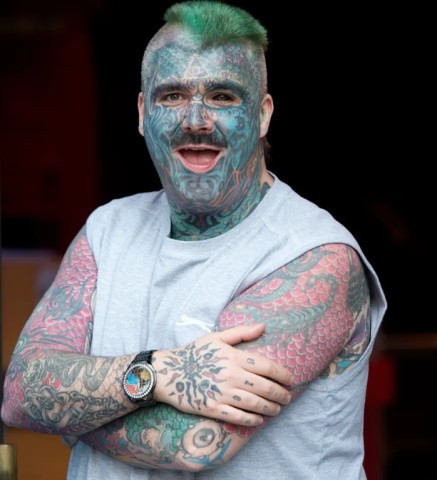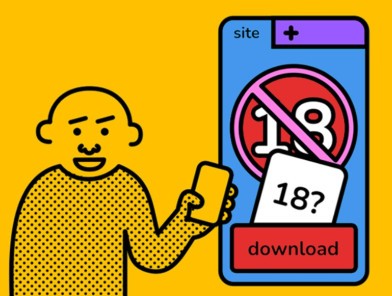In a world increasingly governed by algorithms and regulations, individuality often becomes a glitch in the system. That’s something Britain’s most tattooed man knows better than most. He’s not a political activist or a tech critic. He’s not making headlines for controversial statements or stunts. All he wanted was to visit adult websites like millions of others do every day. But now, he’s become the unexpected face of a legal and technological mess that’s sweeping across the UK.
His name is King Of Ink Land King Body Art The Extreme Ink-Ite yes, legally. He was once known as Matthew Whelan, but that name hardly fits the person he’s become. His face, head, and body are completely covered in tattoos, a walking, breathing piece of living artwork. It’s a commitment to self-expression few people dare to make. And for years, he was celebrated in tattoo communities, featured in media, and even recognized by Guinness World Records. But today, he finds himself denied one of the internet’s most basic indulgences because the system no longer knows what to make of his face.
It began with the UK’s new online age verification law. Meant to prevent minors from accessing pornography, the regulation now requires users to prove they are adults not just with a checkbox, but with official ID and a real-time selfie. That selfie is then cross-checked with facial recognition software. In theory, it sounds secure. In practice, it doesn’t recognize people like King.
When he tried to upload a photo of himself for verification, the system flagged his face as a mask. Not a real person. Just an obstruction. Try after try, the AI refused to let him through, insisting he remove what it thought was face paint or a disguise. But what do you do when your identity is your skin and the system can’t see past it?
For King, this wasn’t just frustrating. It was insulting. His tattoos are a core part of who he is, not something he can or would ever remove. He didn’t spend years transforming his appearance to be told by a machine that he’s not real. That he doesn’t qualify. That his existence breaks the rules.
What makes the story even more absurd is that King isn’t underage. Far from it. He’s in his forties. A fully grown adult with legal rights, personal tastes, and the freedom to browse whatever he wants at least in theory. But under the new system, his face doesn’t match what the law now considers acceptable biometric input. In the eyes of a cold algorithm, he’s become a ghost. A distortion.
His experience shines a harsh light on the assumptions baked into modern technology: that all faces are readable, that identity is universal, that bodies are standard. But they’re not. Some people have tattoos. Some have scars. Others wear religious garments, or have disabilities, or have undergone gender-affirming surgery. These faces don’t confuse humans but they often confuse machines. And when machines are put in charge of who gets access to content, those with unconventional appearances are the first to get pushed out.
King’s case isn’t just a glitch it’s a warning. A reminder that when laws are designed without understanding human diversity, they end up excluding the very people they claim to protect. It’s not that King is asking for special treatment. He’s asking for recognition. To be seen as a person. To be allowed the same rights and access as any other adult.
The irony is sharp. A man who has spent his life turning his body into a canvas defying expectations, celebrating individuality is now being punished for it. Not by society, but by software. Not by people, but by policy.
What does it say about the future we’re building when someone like King is told he must erase his identity just to visit a website? What kind of progress is that?
He never asked to become a symbol of digital exclusion. He just wanted to live his life. But now, in the eyes of the system, the ink on his face makes him invisible.
And that’s a hell of a metaphor for the state of online freedom in 2025.













